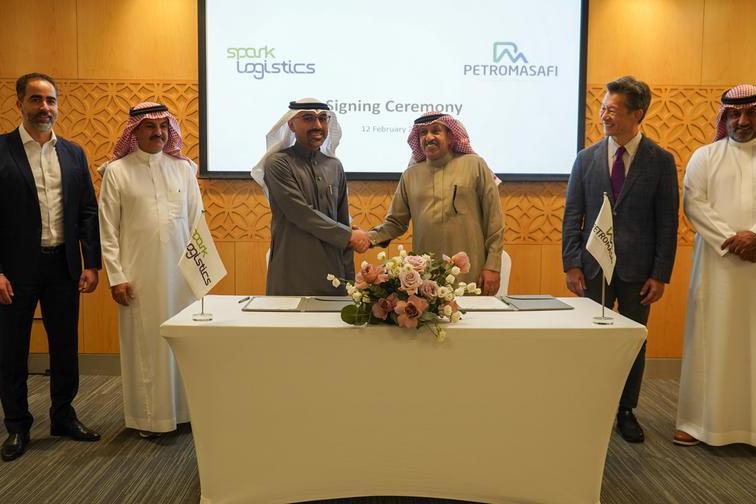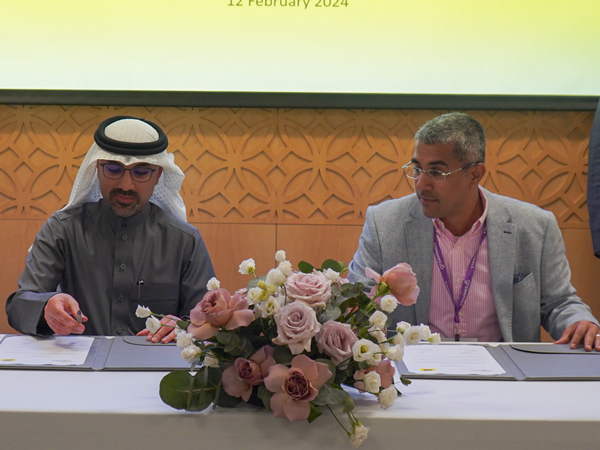Riyadh, Saudi Arabia — In a strategic move to strengthen Saudi Arabia’s logistics and supply chain capabilities, Spark Logistics has signed two significant Memoranda of Understanding (MoUs) with industry leaders ESAB and Petromasafi. These agreements are expected to enhance the efficiency of supply chains, expand product distribution, and align with the Kingdom’s ambitious goals under the National Transport and Logistics Strategy (NTLS).
The MoUs will allow ESAB and Petromasafi to lease pre-built facilities within Spark Logistics’ dry port bonded area, covering over 15,000 square meters. These facilities will serve as manufacturing and distribution hubs, helping streamline the flow of goods across the region. This move is a part of Saudi Arabia’s efforts to become a global logistics hub by 2030, reducing dependency on oil revenues and diversifying the economy.

Strategic Partnerships to Enhance Logistics
The partnership with ESAB, a global leader in welding and cutting technologies, and Petromasafi, a prominent supplier of oil and gas chemical products, marks a significant milestone for Spark Logistics. These MoUs are designed to facilitate faster and more efficient distribution of products, particularly for the oil and gas sector, which is central to Saudi Arabia’s economy.
The agreements also aim to localize parts of the manufacturing process, thereby reducing reliance on imports and supporting local industries. This localization strategy is a core component of Vision 2030, the Kingdom’s blueprint for economic transformation. By investing in local manufacturing and logistics capabilities, Spark Logistics is helping to build a more self-reliant and resilient supply chain infrastructure.
Saif Al Qahtani, Chairman of Spark Logistics, highlighted the importance of these partnerships during the signing ceremony.
“We are delighted to welcome ESAB and Petromasafi as our partners. These MoUs reflect our commitment to building an integrated, world-class logistics ecosystem that supports the Kingdom’s energy sector and beyond,” Al Qahtani said. He further emphasized that these collaborations will play a crucial role in enhancing Saudi Arabia’s industrial capabilities and boosting the efficiency of its supply chains.
Focus on Technology and Infrastructure
Spark Logistics operates the SPARK dry port, the first and largest private dry port in the region, which offers on-site customs clearance services and fully automated systems. The dry port’s strategic location and advanced infrastructure are expected to attract more international businesses seeking efficient logistics solutions in the Middle East.
The agreements with ESAB and Petromasafi are part of a broader strategy to leverage technology and automation to streamline logistics processes. This includes investing in automated warehousing, real-time tracking systems, and AI-driven analytics to optimize supply chain management. By embracing these technologies, Spark Logistics aims to reduce delays, minimize costs, and enhance the overall efficiency of logistics operations.
In addition to infrastructure, Spark Logistics is focusing on sustainability by incorporating energy-efficient practices in its logistics operations. This aligns with Saudi Arabia’s goal to achieve net-zero emissions by 2060 and its broader efforts to promote sustainable development across industries.
Economic Impact and Job Creation
The MoUs are also expected to generate significant economic benefits, including the creation of over 100 new jobs for Saudi nationals. This aligns with Vision 2030’s objective to increase local employment and build a knowledge-based economy. By fostering partnerships with global leaders like ESAB and Petromasafi, Spark Logistics is helping to create high-value jobs in areas such as logistics management, manufacturing, and technology.
The localization of manufacturing and logistics capabilities is expected to boost the competitiveness of Saudi products in regional and international markets. By reducing the reliance on imported goods and services, these initiatives will also help improve the Kingdom’s trade balance.
Emma Collins, Chief Operating Officer of Spark Logistics, emphasized the economic impact of these partnerships.
“By collaborating with industry leaders, we are not only enhancing our logistics capabilities but also contributing to the Kingdom’s economic diversification efforts. Our goal is to build a sustainable and efficient supply chain that supports local industries and creates long-term economic value,” Collins stated.
Supporting Vision 2030’s Logistics Goals
The MoUs align with Saudi Arabia’s National Transport and Logistics Strategy (NTLS), which aims to position the Kingdom among the top 35 countries in the world for logistics performance by 2030. This strategy includes expanding the capacity of ports, enhancing customs clearance processes, and investing in digital transformation initiatives.
By focusing on efficient logistics and supply chain management, Spark Logistics is directly contributing to these goals. The dry port, with its advanced technology and strategic location, is expected to play a key role in reducing transit times and logistics costs for companies operating in the region.
The partnership with ESAB and Petromasafi also underscores the Kingdom’s efforts to attract foreign investments in sectors beyond oil and gas. By offering incentives such as tax breaks, streamlined regulations, and access to state-of-the-art logistics facilities, Saudi Arabia is positioning itself as a preferred destination for global businesses.
Challenges and Future Outlook
While the MoUs represent a significant step forward, Spark Logistics faces challenges in navigating the complexities of the Middle Eastern market. Regulatory compliance, supply chain disruptions, and geopolitical risks are potential hurdles that could impact the effectiveness of these partnerships.
However, industry experts believe that the support of the Saudi government and the alignment with Vision 2030’s objectives provide a strong foundation for success. The Kingdom’s focus on logistics as a key pillar of its economic strategy suggests that the government will continue to invest in infrastructure and regulatory reforms to support companies like Spark Logistics.
The next phase of Spark Logistics’ expansion is expected to focus on digitization and automation. By investing in IoT (Internet of Things), blockchain for supply chain transparency, and predictive analytics, the company aims to enhance the resilience and efficiency of its logistics operations. These technologies will not only improve visibility across the supply chain but also enable proactive management of risks and disruptions.
Conclusion
The signing of these MoUs is a major milestone for Spark Logistics and a clear indication of Saudi Arabia’s determination to become a global logistics powerhouse. By partnering with industry leaders like ESAB and Petromasafi, Spark Logistics is not only enhancing its capabilities but also playing a vital role in advancing the Kingdom’s Vision 2030 goals.
With a focus on technology, infrastructure, and sustainability, Spark Logistics is well-positioned to lead the transformation of Saudi Arabia’s logistics sector. As the Kingdom continues to invest in logistics and supply chain development, the success of these partnerships could serve as a blueprint for future collaborations aimed at diversifying the economy and establishing Saudi Arabia as a leading logistics hub in the Middle East.
Unlocking AI’s Potential: Bridging Saudi Arabia’s Generational Workforce Divide



